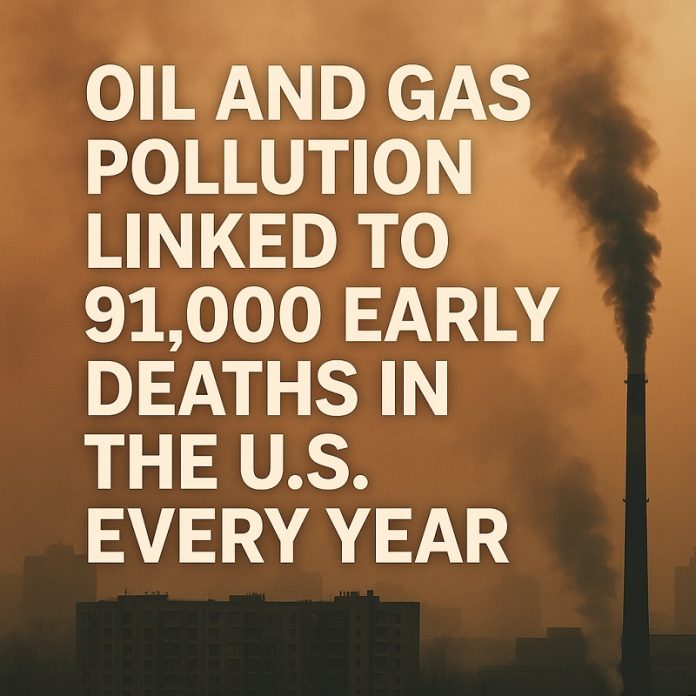
A major new study has found that air pollution from oil and gas activities is killing tens of thousands of people in the United States each year and causing hundreds of thousands of serious health problems.
The research, led by University College London (UCL) and the Stockholm Environment Institute (SEI), reveals that about 91,000 premature deaths annually can be linked to oil and gas air pollution, along with 10,350 preterm births, 216,000 new cases of childhood asthma, and more than 1,600 lifetime cancer cases.
The findings were published in the journal Science Advances.
This is the first study to fully examine the health effects of air pollution from every stage of the oil and gas lifecycle in the US, from the early steps of exploration and drilling to the final use of fossil fuels in vehicles and power plants.
It is also the first to show how the health burden falls unevenly on different racial and ethnic groups, with Black, Asian, Native American, and Hispanic communities consistently facing the heaviest impacts.
To conduct the study, researchers used advanced computer models to track the spread of air pollution from oil and gas activities across the country.
They then compared these pollution maps with data on health risks and outcomes. Lead author Dr. Karn Vohra explained that this approach allowed the team to separate the impact of oil and gas from other pollution sources. “What we found was striking,” he said.
“One in five preterm births and adult deaths caused by fine particle pollution are from oil and gas. Nearly 90 percent of new childhood asthma cases tied to nitrogen dioxide also come from this sector.”
The results show that the stage of oil and gas that contributes the most harm is the final stage, when fossil fuels are burned.
This “end-use” stage is responsible for an overwhelming 96 percent of all health problems linked to the oil and gas industry.
States with large populations such as California, Texas, New York, Pennsylvania, and New Jersey experience the highest total health burdens. But when adjusting for population size, people in New Jersey, Washington D.C., New York, California, and Maryland face the greatest risks.
The study also highlights major racial and ethnic disparities. Native American and Hispanic populations are most affected by pollution from the early and middle stages of oil and gas, such as drilling, transport, and processing. Black and Asian populations are more heavily impacted by the later stages, especially the burning of fossil fuels.
In some regions, the harm is especially severe. For example, Black communities in Southern Louisiana’s “Cancer Alley” and eastern Texas suffer higher-than-average rates of premature death, preterm birth, and childhood asthma.
These inequities are not accidental. They stem from decades of discriminatory practices such as redlining, which forced minority communities to live closer to industrial areas and high-traffic zones. Large factories and refineries have also often been located in or near these neighborhoods, worsening the cycle of pollution and poor health.
The researchers also found that pollution from the US oil and gas industry doesn’t stop at the border. It contributes to around 1,170 early deaths each year in southern Canada and 440 early deaths in northern Mexico.
Senior author Professor Eloise Marais emphasized the importance of putting numbers to what affected communities have long known: “These communities are already aware of their unfair exposure and worse health outcomes. Our study provides science-backed figures that show just how large the burden is.”
The team warns that their estimates are likely conservative. The data they analyzed was from 2017, but since then US oil and gas production has grown by 40 percent and consumption by 8 percent. The study also only looked at outdoor air pollution, meaning the full health toll is almost certainly even higher.
Co-author Dr. Ploy Achakulwisut noted that the research adds urgency to the call for a rapid transition away from fossil fuels. “Our study provides hard numbers,” she said.
“By phasing out oil and gas, we can save hundreds of thousands of children, adults, and elderly people from illness and early death each year—while also reducing climate risks for the future.”



